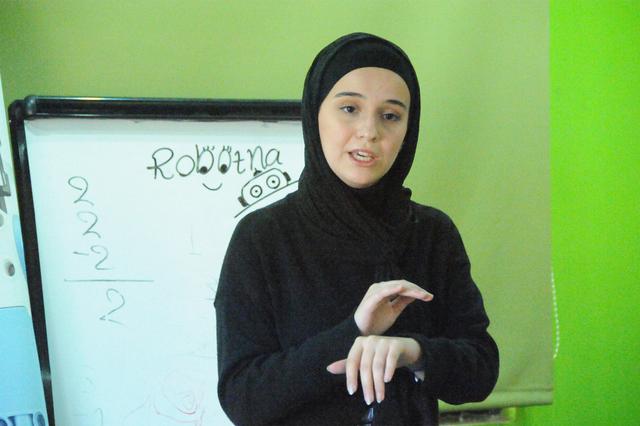Amman - Jasir Al-Harasis, 28, sought to teach young generations about robotics and artificial intelligence, and to consolidate creative thinking skills and future sciences. He launched his first initiative during his university studies in 2013, targeting a number of public school students in Tafileh Governorate (southern Jordan).
With the help of his colleague at the university, Muhannad Al-Labadawi (27 years), the communications engineer Al-Haraseis began teaching students from 8 to 16 years of age the basics of artificial intelligence and creative thinking, in an attempt to guide students towards future sciences, without any financial compensation.
After graduating from university in 2016, the idea of "sustainability of the artificial intelligence initiative" was established, as Al Harasis told Al Jazeera Net that "by establishing our pioneering social and non-profit technology robot company, we provide educational technology products and services."
Al-Harasis and Al-Labadawi worked to collect old robots from educational institutions, and to teach students in poor and less fortunate areas to develop, operate and modify them, targeting government school students from the age group between 6 and 18 years in 8 of the governorates of the outskirts, and the less fortunate, according to Al-Labadawi’s talk to Al Jazeera Net.
In order to secure financial funding for training students in less fortunate areas, the team set out to train students in private schools in the capital Amman, and major cities in Irbid and Zarqa on future sciences, with financial fees that would provide the team with an income that would allow them to train less fortunate students.
The training team then moved to target a new segment of university students and graduates of engineering disciplines, to train them in the technology of creative thinking skills, artificial intelligence and robotics, to help them find better job opportunities and develop their technological capabilities.
All of this is based on the keenness of Al Harasis and his team to “support innovative ideas and projects in the areas of programming, artificial intelligence and robotics to accelerate digital transformation, and encourage youth and youth to adopt a spirit of initiative and creativity in order to bring about positive change,” he said.

Al Harasis and his educational team were able to train about 12,000 male and female students over a period of 9 years, and provided job opportunities for a number of these trainees in the areas of training and work in the artificial intelligence and robotics sector.
The trainees presented pioneering projects and designs in the service of the community and people with disabilities. The most prominent of these projects was designed by the 17-year-old student, Zina Nofal, who was able to design medical glasses equipped with a camera and a hearing aid, to help the blind walk easier on the public road.
As for the 17-year-old student, Lynn Al-Fatiani, she was able to design a smart refrigerator project that helps the blind know what items they hold in their refrigerators, the date of production of these foods, and their suitability for eating, in order to protect them from poisoning.
The projects of Al-Fatiani and Nofal achieved first place in the Arab Cup competition for programming and artificial intelligence within the activities of the competition, which were organized for 3,500 students between the ages of 8 and 16 years from 9 Arab countries, in addition to two other projects for students Qais Odeh and Abdullah Al-Karnz.
The 13-year-old trainee, Salah Al-Shubailat, was able to create an application that allows patients with skin diseases to know the type of disease that affects them, by photographing the symptoms of skin disease with a camera, and inserting images into a computer that recognizes the type of disease through these images; It then provides a medical diagnosis.
As for the 15-year-old student, Malik Saleh, she designed a smart watch for people with hearing impairment that depends on vibration and flicker, and a second watch for the blind that allows them to tell them the time and appointments fixed on it, and presents that to them verbally.
"Robotna" has achieved a number of innovative pilot projects from student trainees, most notably the best technological initiative of the United Nations Volunteers Program 2017, the best 10 humanitarian projects in the Arab world by the Public Authority for Youth in Kuwait, the best 20 social projects in the Middle East and North Africa, and the best social projects in the Middle East and North Africa. 7 Arab initiatives with qualifications from the Arab Media Forum, and others.
The societal pioneering role of the guards and the “Robotna” company did not stop in Jordan only, but the company offered grants to disadvantaged Arab students and refugees, with 200 grants distributed to 3 countries, namely Sudan, Syria, Palestine and Gaza, for the global championship of artificial intelligence known as “Code Avour” ( Codeavour) 2021.
The scholarship includes educating and training students, paying the fees for their participation in the global competition, and supporting them in all stages of the competition, all the way to submitting a design project, in order to open opportunities for them to show their creativity and superiority to the world.
In return for his efforts in community leadership, the International Youth Organization nominated the guards to be a member of the Youth Committee at the World Bank, and he was chosen as a representative of Arab youth in this committee among 17 young people selected around the world, and the committee undertakes the task of designing World Bank programs to reduce the problem of unemployment around the world.
In terms of awards, the students achieved a number of awards, most notably the gold for the best video presented in the Virtual World Robot Championship, the Arab Champion in the Arab Cup for Programming and Artificial Intelligence, the gold for design and strategy in the National Robotics Championship, and second place in the world in the World Championship for Programming and Artificial Intelligence.